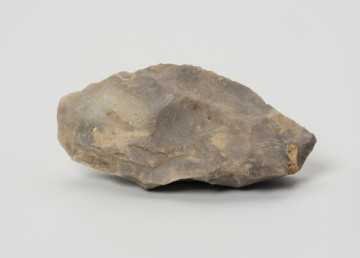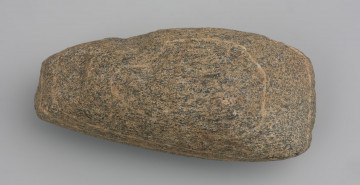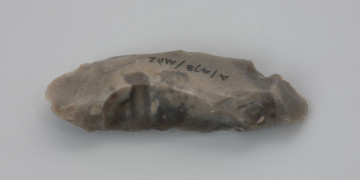
Core axe
7800 p.n.e. — 7000 p.n.e.
National Museum in Szczecin
Part of the collection: Stone Age
The splinter axe from the site at Niedźwiedziska, in the Gryfice district, was discovered during a search by the teacher, Splittgerber, from Gryfice in 1907. Until 1935, it belonged to the collection of the Museum in Gryfice, and then it was handed over to the museum in Szczecin. Thanks to the preserved documentation, it is known that six more shavings were found apart from the axe, three of which have been lost. The axe was made from local, high-quality chalk flint, commonly found in the moraines around Gryfice. It was made by direct hitting the lump of raw material with a hammerstone. The first stage in the production of the tool was to strike a large flake that was then shaped by breaking off smaller flakes and gradually reducing the half-finished product. The axe was a tool used in a frame made of organic raw materials. It has clear wear signs indicating the use for heavy work, such as woodworking or digging. From the manufacturing technology point of view, the axe from Niedźwiedziska represents the so-called Long Blade Industry/LBI, occurring in areas from the western coast of the Baltic Sea in the east to the English Channel in the west, considered as a transitional phase between the late Palaeolithic (Ahrensburg culture) and the early Mesolithic (Maglemose culture). That was a period of fairly rapid environmental change. With the emergence of forests, people's lifestyles changed, and new technologies appeared in the production of tools adapted to the new needs resulting from the availability of raw materials.
Michał Adamczyk
Author / creator
Dimensions
cały obiekt: height: 6.5 cm, width: 4.9 cm
Object type
axe (mesolithic tool)
Technique
hard masher carving, carving
Material
flint, stone
Origin / acquisition method
acquisition
Creation time / dating
Creation / finding place
Owner
National Museum in Szczecin
Identification number
Location / status

7800 p.n.e. — 7000 p.n.e.
National Museum in Szczecin

5400 p.n.e. — 4100 p.n.e.
National Museum in Szczecin

9600 p.n.e. — 5400 p.n.e.
National Museum in Szczecin
DISCOVER this TOPIC
Castle Museum in Łańcut
DISCOVER this PATH
Educational path